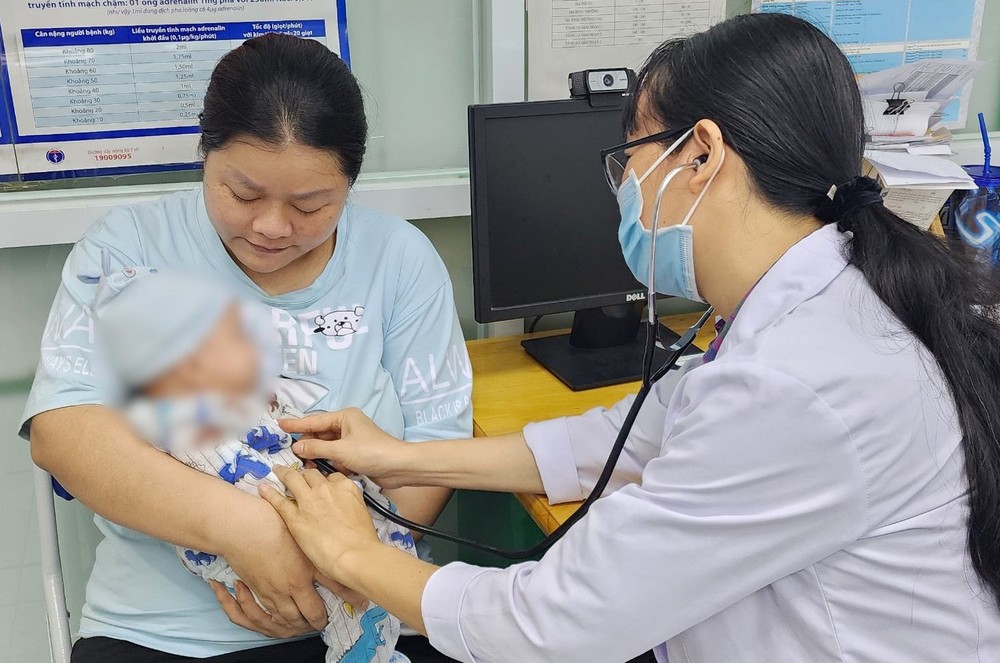
As of June 20, HCMC has recorded 30 cases, with 90 percent of patients under 5 years old and 40 percent under 2 months old (not yet eligible for their first vaccine dose in the Expanded Program on Immunization). Importantly, all affected children have mothers with incomplete or unknown pertussis vaccination history.
Children's Hospital No.2 reports one-third of cases requiring oxygen therapy, and 8 cases presenting with pneumonia, bronchiolitis, bronchopneumonia, or gastroesophageal reflux. Epidemiological investigations show scattered cases without clear links.
According to statistics from the HCMC Pasteur Institute, the Southern region has seen a rise in pertussis cases, totaling 40, in the first five months of 2024. Of these cases, 67.5 percent involve children under 3 months old, and 75.7 percent have either not received vaccinations or are not yet eligible for them.
In response, the HCMC Department of Health has ramped up health education efforts on pertussis prevention and vaccination schedules, particularly for pertussis vaccines among children and pregnant women. They have also intensified regular immunization activities, catch-up vaccination programs, and outreach campaigns targeting children who have not been fully vaccinated.
In Vietnam, pertussis is prevalent nationwide. During outbreaks, the disease can escalate to severe levels, posing a high risk of mortality due to complications like pneumonia and bronchopneumonia, particularly among children under 5 and those who are malnourished. Outbreaks tend to recur in cycles spanning approximately 3 to 5 years. Vaccination is available as part of the Expanded Program on Immunization to prevent the disease.
On June 20, the HCMC Department of Health submitted a proposal to the city's People's Committee to implement a supplementary measles vaccination campaign for children aged 1-5.
According to the department, the city has seen an increase in measles cases among children under 5 who were not fully vaccinated this year. The shortage of measles and measles-rubella vaccines from the Central Institute of Hygiene and Epidemiology in 2022 is cited as the cause. This interruption led to many children missing their vaccination schedules, thereby reducing community immunity against measles.
In April 2024, the HCMC Center for Disease Control (HCDC), in partnership with the Oxford University Clinical Research Unit (OUCRU), Hospital for Tropical Diseases, and Children's Hospital No.1, conducted a community immunity survey on measles. The findings revealed that only 86 percent of children aged 9 months to under 5 years in the city had protective antibodies against measles. According to the World Health Organization (WHO), maintaining a 95 percent vaccination rate with two doses of measles vaccine among children under 2 years old is crucial for measles elimination.
Furthermore, HCDC assessed the risk of measles outbreaks using the WHO's measles outbreak risk assessment tool, which indicated a very high risk across the city. Consequently, without timely preventive measures, there is a significant threat of measles outbreaks spreading throughout HCMC.
The Department of Health has proposed to the HCMC People's Committee to approve the implementation of a supplementary vaccination campaign for all children aged 1-5 residing in the city. The proposal recommends using the combined measles-rubella vaccine, part of the Expanded Program on Immunization, and mandated for those at risk of these diseases.
Regarding the estimated budget for procuring measles-rubella vaccines, measles-rubella solvents, training, communication, and other expenses, totaling over VND4.3 billion, these funds will be drawn from the Department of Health's 2024 healthcare budget.
























